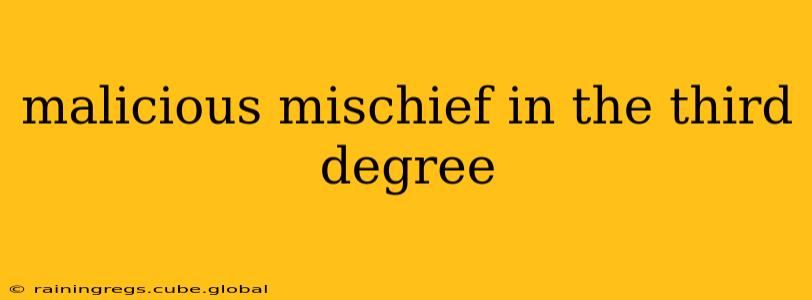Malicious mischief in the third degree is a criminal offense that involves intentionally damaging or destroying another person's property. While seemingly straightforward, the specifics of this crime vary significantly by jurisdiction. This guide aims to provide a comprehensive overview, clarifying the key elements and potential consequences. Note: This information is for educational purposes only and should not be considered legal advice. Always consult with a qualified legal professional for advice regarding specific legal situations.
What Constitutes Malicious Mischief in the Third Degree?
The core element of third-degree malicious mischief is the intentional damage or destruction of property belonging to another. This isn't limited to physical destruction; it can also encompass defacement, rendering the property unusable, or significantly diminishing its value. The specific acts that qualify vary widely depending on the state or region. Some jurisdictions might require a specific monetary threshold of damage, while others focus on the intent behind the actions.
What is Considered "Property"?
The definition of "property" is broad. It typically includes real property (land and buildings), personal property (belongings like vehicles, electronics, and clothing), and even intangible property in some cases (e.g., data). The crucial factor is that the property must belong to someone other than the perpetrator.
What is the Level of Intent Required?
Generally, the prosecution needs to demonstrate that the damage was caused intentionally, not accidentally. Reckless behavior might constitute a lesser charge, depending on the jurisdiction and specific circumstances. The prosecution must prove that the defendant acted with knowledge that their actions would likely cause damage to another person's property. Simple negligence is typically not enough to result in a conviction.
What are the Penalties for Third-Degree Malicious Mischief?
The penalties for a third-degree malicious mischief conviction vary greatly depending on the jurisdiction and the specifics of the case. Possible consequences can include:
- Fines: These can range from hundreds to thousands of dollars.
- Jail time: Sentences can range from a few days to several years, depending on the severity of the damage and the defendant's criminal history.
- Probation: This may involve conditions such as community service, restitution to the victim, and participation in anger management or other rehabilitation programs.
- Restitution: The court may order the defendant to pay the victim for the cost of repairing or replacing the damaged property.
What is the Difference Between Third-Degree Malicious Mischief and Other Degrees?
Many jurisdictions have different degrees of malicious mischief, reflecting the severity of the crime. Generally, higher degrees involve more significant damage, higher monetary thresholds, or the involvement of aggravating factors like hate crimes or use of weapons. Lower degrees typically involve less severe damage or less intentional actions. The specifics of these distinctions vary greatly between states and even counties.
What are the Defenses Against Third-Degree Malicious Mischief Charges?
A successful defense against a third-degree malicious mischief charge often hinges on challenging the prosecution's ability to prove the key elements of the crime. Potential defenses might include:
- Lack of intent: The defendant may argue that the damage was accidental or unintentional.
- Consent: The defendant might claim they had permission from the property owner to damage or destroy the property.
- Self-defense: In rare cases, the defendant might claim they damaged property in self-defense or to protect another person.
- Mistake of fact: The defendant might argue that they genuinely believed they had the right to damage the property.
How Can I Avoid Being Charged With Third-Degree Malicious Mischief?
The best way to avoid charges is to respect the property of others and refrain from any actions that could be considered damaging or destructive. Understanding the specific laws in your jurisdiction is crucial, especially if working with or near property that doesn't belong to you. If you're unsure whether an action might constitute malicious mischief, it is always best to err on the side of caution.
This information provides a general overview; the specific laws and penalties for malicious mischief vary considerably by location. For accurate and up-to-date legal guidance, always consult with a qualified legal professional in your jurisdiction.
